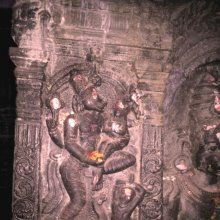Maharshi, Maharishi, Mahaṛṣi, Maharṣi, Mahārṣi: 20 definitions
Introduction:
Maharshi means something in Buddhism, Pali, Hinduism, Sanskrit, Jainism, Prakrit, Marathi, Hindi. If you want to know the exact meaning, history, etymology or English translation of this term then check out the descriptions on this page. Add your comment or reference to a book if you want to contribute to this summary article.
Maharshi has 18 English definitions available.
The Sanskrit terms Mahaṛṣi and Maharṣi and Mahārṣi can be transliterated into English as Maharsi or Maharishi or Maharshi, using the IAST transliteration scheme (?).
Images (photo gallery)
Languages of India and abroad
Sanskrit dictionary
[Deutsch Wörterbuch]
Source: Cologne Digital Sanskrit Dictionaries: Böhtlingk and Roth Grosses Petersburger WörterbuchMaharṣi (महर्षि):—[(mahā + ṛṣi)] m.
1) ein grosser Ṛṣi (s. u. ṛṣi) [Taittirīyāraṇyaka 1, 9, 6.] [Manu’s Gesetzbuch 1, 1. 4. 36. 3, 69.] maharṣipitṛdevānām [?4, 257. 5, 3. 6, 32. 8, 110. 11, 29 (= Mahābhārata 12, 6054). Bhagavadgītā 10, 2. 11, 21. Indralokāgamana 5, 25. Nalopākhyāna 5, 28. 9, 22. Rāmāyaṇa 1, 4, 17. 5, 21. 59, 3. 63, 17. Suśruta 2, 377, 11. Śākuntala 101, 7. Rgva tch’er rol pa ed. Calc. 251, 5. WEBER, Jyotiṣa 60.] patīnprajānāmasṛjaṃ maharṣīnādito daśa .. marīcimatryaṅgirasau pulastyaṃ pulahaṃ kratum . pracetasaṃ vasiṣṭhaṃ ca bhṛguṃ nāradameva ca .. [Manu’s Gesetzbuch 1, 34. fg.] bhṛgurmarīciratriśca aṅgirāḥ pulahaḥ kratuḥ . manurdakṣo vasiṣṭhaśca pulastyaśceti te daśa .. brahmaṇo mānasā hyete utpannāḥ svayamīśvarāḥ . paratvenarṣayastasmādbhūtāstasmānmaharṣayaḥ .. [MĀTSYA-Pāṇini’s acht Bücher 120 im Śabdakalpadruma] brahmaṇo mānasāḥ putrā viditāḥ ṣaṇmaharṣayaḥ . marīciratryaṅgirasau pulastyaḥ pulahaḥ kratuḥ .. [Mahābhārata 1, 2518. 2565.] prajānāṃ patayaḥ sapta sapta caiva maharṣayaḥ [Harivaṃśa 14146.] bhṛgu [Manu’s Gesetzbuch 3, 69.] maharṣīṇāṃ bhṛguraham (sagt Kṛṣṇa) [Bhagavadgītā 2, 25.] Vasiṣṭha [Rāmāyaṇa 1, 54, 4.] [Raghuvaṃśa 1, 48. 2, 45.] Nārada [Nalopākhyāna 14, 5.] Kaṇva [Śākuntala 7, 17. 28, 13.] vyāsādayaḥ [Trikāṇḍaśeṣa 2, 7, 15.] Vālmīki [Rāmāyaṇa 1, 2, 43.] Vibhāṇḍaka [9, 28.] unter den Beiww. Śiva’s [Śivanāmasahasra] Buddha's [Vyutpatti oder Mahāvyutpatti 1.] —
2) Nomen proprium eines Mannes [Weber’s Verzeichniss No. 246.]
--- OR ---
Mahaṛṣi (महऋषि):—m. = maharṣi
1) [Atharvavedasaṃhitā 19, 9, 11.]
Source: Cologne Digital Sanskrit Dictionaries: Sanskrit-Wörterbuch in kürzerer FassungMahaṛṣi (महऋषि):—m. = maharṣi 1)
--- OR ---
Maharṣi (महर्षि):—m. —
1) ein grosser Ṛsi. —
2) Beiname — a) Śiva's. — b) *Buddha's. —
3) Nomen proprium eines Mannes.
Sanskrit, also spelled संस्कृतम् (saṃskṛtam), is an ancient language of India commonly seen as the grandmother of the Indo-European language family (even English!). Closely allied with Prakrit and Pali, Sanskrit is more exhaustive in both grammar and terms and has the most extensive collection of literature in the world, greatly surpassing its sister-languages Greek and Latin.
See also (Relevant definitions)
Starts with: Maharshihridaya, Maharshika, Maharshisamgha.
Ends with: Mardamaharshi, Rishisharman maharshi.
Full-text (+236): Atharvabhuta, Acyutapajas, Acyutamanas, Ayonija, Asuri, Valmiki, Mahavalabhid, Shushka, Brahmarshi, Pushkari, Nidagha, Carushirsha, Angirajva, Sumedhas, Shakayanya, Bhandyayana, Himavant, Kandyayana, Suranemin, Guru.
Relevant text
Search found 74 books and stories containing Maharshi, Maha-rishi, Maha-rshi, Maha-ṛṣi, Maha-rṣi, Maharishi, Mahaṛṣi, Maharṣi, Maharsi, Mahārṣi; (plurals include: Maharshis, rishis, rshis, ṛṣis, rṣis, Maharishis, Mahaṛṣis, Maharṣis, Maharsis, Mahārṣis). You can also click to the full overview containing English textual excerpts. Below are direct links for the most relevant articles:
Puranic encyclopaedia (by Vettam Mani)
Shankaracharya and Ramana Maharshi (study) (by Maithili Vitthal Joshi)
Chapter 3.3 - Ramaṇa Maharṣi on Brahman
Chapter 3.1 - Ramaṇa Maharṣi on Jīva
The Markandeya Purana (Study) (by Chandamita Bhattacharya)
1.9: The Authorship of the Mārkaṇḍeya-purāṇa < [Chapter 1]
The philosophy of Yoga (Introduction) < [Chapter 4]
1.8: An Introduction of the Mārkaṇḍeya-purāṇa < [Chapter 1]
Sanskrit sources of Kerala history (by Suma Parappattoli)
3. The Kokila-sandesa by Uddanda < [Chapter 4 - Traces of Historical Facts from Sandesha Kavyas and Short poems]
Atharvaveda and Charaka Samhita (by Laxmi Maji)
Caraka (Āyurveda scholar) < [Chapter 1 - Introduction]
Introduction to Āyurveda < [Chapter 1 - Introduction]
History of Āyurveda < [Chapter 1 - Introduction]
The Devi Bhagavata Purana (by Swami Vijñanananda)
Related products
(+18 more products available)








